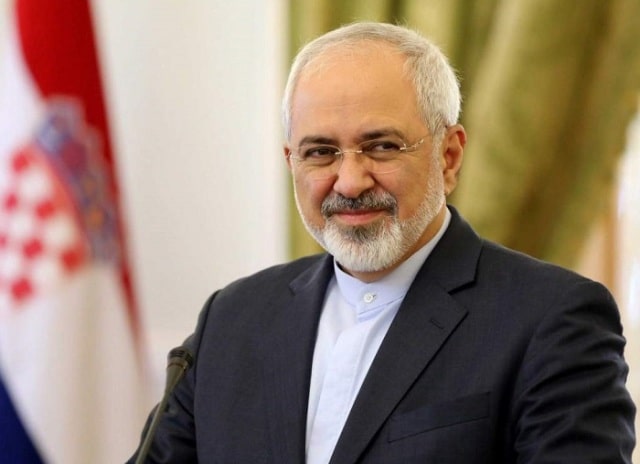Continuing their campaign to separate European countries from the US, top Iranian officials proclaimed on Sunday that Washington has been isolated over the July 2015 nuclear deal.
On a trip to South Africa, Foreign Minister Mohammad Javad Zarif (pictured) said, following the recent statement of Donald Trump denouncing the agreement and the prospect of more US sanctions on Iran:
The policies of the Trump Administration are isolated in the world….Even the closest US allies have in fact stood up against Trump’s anti-JCPOA [Joint Comprehensive Plan of Action] policies … and have adopted clear stances in this regard.
Iran has said that, if the US leaves the deal with the 5+1 Powers (US, UK, France, China, Russia, and Germany), it might do so as well. However, Tehran’s focus has been on persuading the European Union and its members to sustain the agreement and to step up trade and investment with the Islamic Republic.
Zarif also seized the opportunity to counter the latest US move, Secretary of State’s Rex Tillerson presence at a high-level weekend meeting in Riyadh of Saudi and Iraqi officials: “Unfortunately, the Americans do not want to rectify their viewpoint [and understand] that Iran is a source of stability and peace as well as a campaigner against terrorism in the region.”
The Foreign Minister insisted that the Islamic State would have established its government in Syria, Iraq, and Iraqi Kurdistan had the Iranian military not led foreign militias and assisted Baghdad and the Assad regime.
The remark was a direct riposte to Tillerson, who said on Sunday, along Saudi Foreign Minister Adel al-Jubeir, that “Iranian militias” in Iraq should leave now that the Islamic State has lost its major positions.
Zarif emphasized that the militias supported by the Iranians in Iraq are made up of local lmen:
Exactly what country is it that Iraqis who rose up to defend their homes against ISIS return to? Shameful US FP, dictated by petrodollars.
— Javad Zarif (@JZarif) October 22, 2017
Zarif urged US politicians to “correct their wrong views as soon as possible and stop supporting Saudi Arabia in killing Yemeni children and the elderly” in the Saudi-led intervention against the Ansar Allah (Houthi) insurgency in Yemen.
Velayati:
The Supreme Leader’s top aide, Ali Akbar Velayati, pressed the Iranian strategy on Sunday as he met a Dutch delegation led by a prominent MP: “The policy adopted by Europe, including the Netherlands, on the nuclear issue is different from the policy of the United States of America.”
Velayati said European countries did not accept US violations of the JCPOA and would remain committed to the accord.
Following Trump’s speech on October 13, European leaders — including the European Union’s foreign policy head Federica Mogherini and a statement by UK Prime Minister Theresa May, French President Emmanuel Macron, and German Chancellor Angela Merkel — reaffirmed their belief in the JCPOA and Iran’s adherence to its terms.

